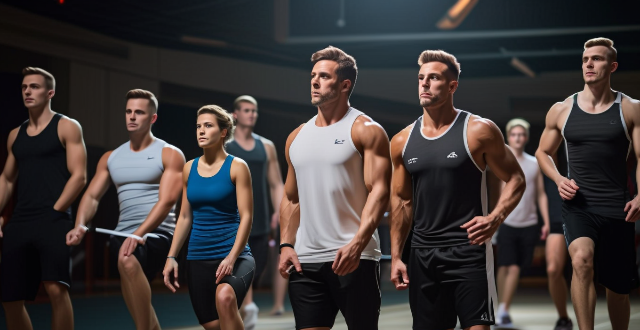In sports psychology, elite athletes are distinguished from their average counterparts by a combination of psychological traits, physiological factors, and environmental influences. Key differences include mental toughness, self-confidence, focus, emotional regulation, motivation, and the quality of support systems. Elite performers typically exhibit superior resilience, set ambitious goals, maintain better concentration, manage emotions effectively, possess intrinsic motivation, and train in environments that foster excellence. In contrast, average performers may struggle with these aspects, leading to suboptimal performance. Understanding these distinctions can help coaches, athletes, and sports psychologists develop strategies for improvement and success.

Differentiating Between Elite and Average Performers in Sports Psychology
In sports psychology, the distinction between elite and average performers is multifaceted, encompassing a range of psychological, physiological, and environmental factors. Here's a detailed exploration of how these differences manifest:
I. Mental Toughness and Resilience
Elite athletes often exhibit superior mental toughness and resilience compared to their average counterparts. This means they are better at handling pressure, setbacks, and challenges without losing focus or motivation.
A. Goal Setting and Commitment
- Elite Performers: Set ambitious, specific goals and commit fully to achieving them.
- Average Performers: May have vague or less challenging goals and waver in their commitment.
B. Coping with Adversity
- Elite Performers: Possess effective strategies for dealing with adversity and view challenges as opportunities for growth.
- Average Performers: Are more likely to become discouraged by setbacks and lack effective coping mechanisms.
II. Self-Confidence and Belief
The level of self-confidence and belief in one's abilities is another key area where elite and average performers differ.
A. Self-Efficacy
- Elite Performers: Have a strong belief in their ability to execute necessary skills under pressure.
- Average Performers: Often doubt their capabilities, especially in high-pressure situations.
B. Visualization and Affirmation
- Elite Performers: Regularly use visualization techniques and affirmations to reinforce confidence.
- Average Performers: May not utilize these tools consistently or effectively.
III. Focus and Concentration
The ability to maintain focus and concentration during competition or training is crucial for peak performance.
A. Attentional Control
- Elite Performers: Can selectively focus on relevant cues and ignore distractions.
- Average Performers: Tend to be more easily distracted and struggle with maintaining attention.
B. Pre-Performance Routines
- Elite Performers: Develop consistent pre-performance routines to optimize focus.
- Average Performers: May not have a structured routine or vary it frequently.
IV. Emotional Regulation
Managing emotions effectively is vital for sustained success in high-level competition.
A. Stress Management
- Elite Performers: Use techniques like meditation, breathing exercises, or mindfulness to manage stress.
- Average Performers: May not employ such strategies or rely on less effective methods.
B. Post-Event Recovery
- Elite Performers: Have strategies for emotional recovery after events, allowing them to refocus quickly.
- Average Performers: May take longer to emotionally recover from negative outcomes.
V. Motivation and Drive
The drive to improve and push beyond perceived limits separates elite athletes from the rest.
A. Intrinsic Motivation
- Elite Performers: Are intrinsically motivated by the love of the sport and personal improvement.
- Average Performers: May rely more on external rewards or validation.
B. Persistence and Hard Work
- Elite Performers: Display an unwavering work ethic and commitment to continuous improvement.
- Average Performers: Might be more prone to taking shortcuts or giving up when faced with obstacles.
VI. Support Systems and Environment
The environment surrounding an athlete, including coaches, teammates, and support staff, plays a crucial role.
A. Coach-Athlete Relationship
- Elite Performers: Typically have a supportive, communicative relationship with their coaches.
- Average Performers: May not have this level of support or open communication.
B. Training Environment
- Elite Performers: Train in environments that foster excellence and continuous development.
- Average Performers: May be in settings that are less conducive to reaching their full potential.
In conclusion, while there is no single formula that defines an elite athlete, these psychological characteristics and environmental factors play a significant role in distinguishing between those who reach the pinnacle of their sport and those who do not.